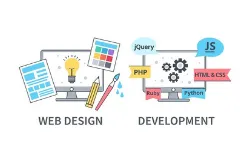What IS Big Data?
Big Data is a phrase that usually describes a voluminous amount of data, both structured and non-structured. It basically deals with three things-
The extreme volume of data Around 6 million people use digital media and it is estimated that about 2.5 trillion bytes of data are generated each day. The wide variety of data types, and Most of the data is unstructured in nature. The velocity with which the data must be processed. It indicates the speed at which the data emanates and changes occur between the various data sets.
Big Data is a collection of data records that are so massive and complicated that long-established applications and data processing software are ineffective in managing them. It can be from multiple different sources, such as commercial sales records, assembled results of scientific experiments or real-time sensors used in the Internet of Things.
Some of the industries driven by big data analysis are: Services of the public sector.
-
Health contributions.
-
Learning services.
-
Insurance services.
-
Industrial and natural resources.
-
Transport services.
-
Banking sectors
-
Fraud detection.
Which sectors use Big Data?
Big data affects organizations in virtually every industry. Let’s see how each industry can benefit from this flood of informatio
Education Educators armed with data-based information can have a significant impact on school systems, students and their curriculum. By analyzing large volumes of data, they can identify at-risk students, ensure that the students progress appropriately and can implement a better system for the evaluation and support of teachers and principals.
Government When government agencies take advantage of big data and apply analysis, they gain lot of help in managing public services, managing agencies, dealing with traffic congestion and preventing crime. But while big data has many advantages, governments must also address issues of transparency and privacy.
Health Care Patient records, treatment plans and prescription information… When it comes to health care, everything must be done quickly, accurately and, in some cases, with sufficient transparency to comply with strict industry regulations. When the big data is handled effectively, healthcare providers can discover hidden ideas that improve patient care. Improven medical care can be done by data-driven medicines which involves the analysis of a large number of medical records and images for patterns that can help detect diseases early and develop new medicines.
Banking With a wealth of information that comes from countless sources, banks are faced with the search for new and innovative ways to manage big data. Though it is important to understand customers and increase their satisfaction, it is equally important to minimize risk and fraud while maintaining regulations. Big data provides good insights, but it also requires financial institutions to stay one step ahead with the help of advanced analysis.
Predicting and responding to natural and man-made disasters We can analyze the sensor data to predict where earthquakes are most likely to occur. The pattern of human behavior can provide clue that can help organizations in providing relief to the survivors. Big Data is also used to protect and monitor the flow of refugees away from war zones around the world.
Crime prevention Police forces are increasingly adopting strategies based on data of their own intelligence and public data sets in order to deploy resources more efficiently and act as a deterrent where necessary.
Manufacturing Armed with a vision that big data can provide, manufacturers can increase quality and production while minimizing waste, processes that are key in the highly competitive market today. More and more manufacturers are working in a culture based on analysis, which means they can solve problems faster and make more agile business decisions.
Retail It is critical for the retail industry to build customer relationships, and the best way to do this is to manage big data. Retailers must know the best way to market to customers, the most effective way to handle transactions and the most strategic way to return the expired business. Big data is the heart of all these things.
SOME OF THE CAREER PROSPECTS IF WE STUDY BIG DATA ARE- Big Data Architect
-
Big Data Project Manager
-
Big Data Specialist
-
Big Data Analyst
-
Big Data Engineer
-
Big Data Developer
WHAT ARE THE ROLES OF BIG DATA?
In today’s life, Big Data usually confronts with data capturing, it’s storage, analysis, transfer, sharing, querying, updating, searching, visualization and privacy.
It is quite amazing to wonder that why is big data growing so enormously? The reason why almost every company is adopting is-
It is timely. We can get the insights from a large amount of data from different sources in an instant.
It provides better analytics. For example, a Big Data analyst may aim at analyzing a product’s success and future sales by having a look and correlating past sales data. This can be helpful in realizing the pros and cons of the business and can result in a better planning for future sales.
It manages with the huge amount of data. Big Data technologies manage vast amount of data.
It gives insights. We can provide a better understanding with the help of semi-structured and unstructured information.
It helps in decision-making. It helps in mitigating risk and makes smart decisions by proper risk analysis.
Importance of Big Data:
The importance of big data does not depend on the amount of data you have, but on what you do with them. You can take data from any source and analyze it to find answers that allow-
1) cost reductions.
2) time reductions.
3) development of new products and optimized offers, and
4) intelligent decision making.
When you combine large data with high-powered analysis, you can perform tasks related to the business, such as: Determination of the root causes of failures, problems and defects in almost real time. Generation of coupons at the point of sale according to the customer's purchasing habits. Recalculate full risk portfolios in minutes. Detect fraudulent behavior before it affects your organization.
With this, we can say that Big Data is taking the world by storm. As the importance of analytics has grown tremendously during the past few years, it is depicted to grow even more in the coming decades.
Big Data Concerns
Though Big Data gives us enormous amount of opportunities and information, but it also raises some questions and concerns that need to be addressed:
Data privacy: Big data that we generate now-a-days contains a lot of information about our personal lives, much of which we have the right to keep private. Increasingly, we are being asked to strike a balance between the amount of personal data we disclose and the convenience offered by applications and services driven by Big Data.
Data security: Even if we decide that we are happy that someone has our data for a particular purpose, can we trust that they will keep it safe?
Discrimination of data: When everything is known, will it be acceptable to discriminate against people based on the data we have in their lives? We already use credit score to decide who can borrow money, and the insurance is strongly based on data. We can expect to be analyzed and evaluated in greater detail, and care must be taken that this is not done in a way that contributes to hindering the lives of those who already have less resources and access to information.
Facing these challenges is an important part of Big Data and must be addressed by organizations that want to take advantage of the data. Otherwise, it can leave companies vulnerable, not only in terms of their reputation, but also legally and financially.
WHAT IS THE SYLLABUS OF BIG DATA?
Content of the Big Data Analytics course are as follows-
1. Big Data Overview This includes topics such as big data history, its elements, knowledge related to the race, advantages, disadvantages and similar topics.
2. Use of Big Data in companies This module should focus on the perspective of the Big Data application that covers topics such as the use of big data in marketing, analysis, retail, hospitality, consumer goods, defense, etc.
3. Technologies to handle Big Data Big Data is mainly characterized by Hadoop. This module covers topics such as Introduction to Hadoop, Hadoop operation, cloud computing (features, advantages, applications), etc.
4. Understanding the Hadoop ecosystem This includes learning about Hadoop and its ecosystem, which includes HDFS, MapReduce, YARN, HBase, Hive, Pig, Sqoop, Zookeeper, Flume, Oozie, etc.
5. Go deeper to understand the basics of MapReduce and HBase This module must cover the entire MapReduce framework and the uses of MapReduce.
6. Understand the basics of Big Data Technology This module covers the big data stack, that is, data source layer, ingestion layer, source layer, security layer, visualization layer, visualization approaches, etc.
7. Databases and data warehouses This module should cover everything about databases, the persistence of polygons and their related introductory knowledge.
8. Using Hadoop to store data This includes a complete module of HDFS, HBase and their respective ways of storing and managing data along with their commands.
9. Learn to process data using MapReduce This emphasizes the development of a simple MapReduce framework and the concepts applied to it.
10. Test and debug MapReduce applications After developing the applications, the next step is to test and debug them. This module imparts this knowledge.
11. Learn Hadoop YARN Architecture This module covers the background of YARN, the advantages of YARN, work with YARN, compatibility with previous versions of YARN, YARN commands, record management, etc.
12. Exploring the hive These modules present you with all the necessary knowledge of Hive.
13. Exploring the pig This module presents all the necessary knowledge about the PIG.
14. Exploring Oozie These modules present you with all the necessary knowledge of Oozie.
15. Learn NoSQL data management This module covers everything about NoSQL, including document databases, relationships, graphics databases, databases with fewer schemas, CAP theorem, etc.
16. Integrate R and Hadoop and understand the hive in detail This module introduces R and Hadoop, ways to do text mining and related knowledge.
WHAT IS THE AVERAGE COURSE FEES OF BIG DATA?
The fees for a Big Data course depends on from where an individual is taking up the course. If someone wishes to study this course, different sites offer different prices. Certification courses are expensive than the training courses. There are some other factors also that influence the course fees. For example, who is the instructor, the site is renowned or not, or is the site trusted by companies or not. Both online and offline courses are available on Big Data. Even some Universities have also started teaching this course with their Computer Science branch. The cost of online courses roughly ranges between Rs. 1000- Rs. 30,000 depending on the vastness and quality of course.
WHAT ARE THE MODULES OF BIG DATA?
-
Module 1 - What is Big Data?
-
Introduction to Big Data
-
Big Data characteristics
-
What are the Big Data V?
-
The impact of Big Data
Module 2 - Big Data - Beyond the hype Big Data examples
-
Big Data Sources
-
Adoption of Big Data
-
Pre-processing for Data Integration
-
Post processing after Data Integration
Module 3: Big Data and Data Science The Big Data platform
-
Big Data and Data Science
-
Skills for data scientists
-
The process of data science
-
Automating work-flow through Data Pipelining
Module 4 - Use cases Big Data Exploration
-
The enhanced 360 view of a client
-
Security and Intelligence
-
Operations analysis
-
R for Big Data analytics
-
Big Data analytics with R
Module 5 - Big Data Processing Big Data Ecosystems
-
Hadoop framework
-
Capstone project
-
Machine Learning with Spark
-
Hive, Pig and Oozie
-
Advanced NoSQL DBs
Course Outcomes-
After you finish up the course,you would know the What, Why and How of all these topics- Understand how data is growing at a rapid rate and concept of big data ecosystem.
-
Distinguish between structured data, semi-structured data and unstructured data.
-
Understand flat files, tabular and relational databases, NoSQL data stores, and the requirement for its storage and processing.
-
Understand the volume, velocity, variety, and value of information mining and benefits of big data.
-
Learn the concept of data lake, Data Lake sources, data lake storage, and distinguish between vertical scaling and horizontal scaling.
-
The Hadoop framework
-
Learn to process data using MapReduce and test and debug MapReduce applications
-
Learn Hadoop YARN Architecture
-
Explore the hive, pig and Oozie.
-
Learn NoSQL data management
-
Integrate R and Hadoop and understand the hive in detail
WHAT IS THE FUTURE OF BIG DATA?
The data is changing our world and the way we live at an unprecedented rate. If Big Data is capable of all this today, imagine what tomorrow will be capable of. The amount of data available with us will only multiply and the analysis technology will become more and more advanced.
For companies, the ability to take advantage of Big Data will become increasingly critical in the coming years. The companies that see big data as a strategic asset are the ones that will survive, while those that ignore this revolution run the risk of being left behind.
Most Popular Courses
AWS Certification Training || Big Data || Google Cloud certification







